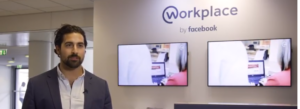How much is work changing?
- 8 Min Read
Within this ever developing and changing world of work, the role of HR departments and their leaders are changing too. But what are the key changes we should expect? Cath Everett explains.
- Author: Cath Everett
- Date published: Aug 8, 2018
- Categories

Demographics have played a large part here as members of the Baby Boomer generation start to retire and digital-native Millennials and Generation Z increasingly take their place, bringing their own characteristics and preoccupations to bear. The sheer speed of digital innovation has also had a big impact, generating all kinds of organisational and economic shifts and often leaving older, more traditional businesses struggling to keep up.

But nowhere is this change more obvious than in the HR function. In the past, the so-called ‘personnel’ department was very much focused on efficiency. HR managers devised corporate policies and procedures and ensured the smooth running of transactions and services such as payroll.
The evolution of HR
The “second wave of HR”, with its focus on “effectiveness”, first started in the late 1980s – and is still very much alive today, according to Sharon Olivier, discipline lead for people and talent at Hult International Business School’s Ashridge Executive Education.
It saw HR professionals developing a deeper understanding of how the business worked. This led them to assume a more strategic role by partnering with senior leaders and, ultimately, “co-creating solutions to take the business where it needed to go”, says Olivier.
Over recent times though, these two forms of HR have in many instances become increasingly distinct from each other, believes Jo Taylor, global talent director at talent and organisational development consultancy, Let’s Talk Talent. On the one hand, large chunks of operational HR, which covers the transactional side of things, have been streamlined and automated, in the corporate space at least.
On the other, many companies have also created “value-add” teams, which include HR business partners and focus on what Taylor calls the “colleague experience”.
“About three years ago, AirBNB did something very cool and changed the title of its HR director to ‘chief colleague experience officer,” she explains. “It was revolutionary because what the talent of today want is an ‘experience’ involving more autonomy and trust – not the same old career development plans, nine-box grids and performance management.”
As a result, Taylor adds, the HR role of today is becoming “more about creating an experience to make talent want to stay, in a world that is moving faster and where people have more choice than five or 10 years ago”.
To do so involves creating a more personalised rather than collective ‘experience’, which has traditionally involved putting people into buckets such as age and providing them with what are believed to be appropriate programmes.
Make purpose a driver
Another key consideration in this context, believes Jason Gowlett, HR operations director at Direct Line Group (DLG), is ensuring that both leaders and employees’ understand their purpose, what drives them and how they can fulfil that purpose through their work.
As a result, about 18 months ago, the insurance company launched a three-day residential workshop for senior and middle managers called ‘Engage’. Led by expert facilitators, the aim was to help leaders at all levels develop sufficient self-awareness to understand their purpose and how it aligned with that of the organisation in order to inspire others.
A further goal, Gowlett explains, was “to drive open and honest conversations because it’s important that leaders know their team and what matters to them”. For example, “if as a leader you want to recognise and reward someone for doing a good job, it’s important you know who will be happy to stand in front of the team to receive praise and who will just cringe,” he points out.
In reality, such considerations are part of an emerging “third HR wave”, which is all about “transformation”, believes Ashridge’s Olivier. HR leaders are increasingly finding that, rather than simply focus on ‘people’ and the ‘business’ as was the case in the past, it is now necessary to take technology into consideration too. This is because artificial intelligence and robotic process automation systems are, over time, expected to lead to the creation of so-called “augmented workforces” that work in tandem with machines, each playing to their own strengths.
To cope adequately with such change, it will be necessary for many organisations to restructure themselves into agile “ecosystems”. Ecosystems essentially comprise flat, cross-functional networks of teams that are more autonomous and empowered than is generally the case today and whose make-up and emphasis can shift quickly in line with changing business requirements.
DLG, for example, is setting up more and more “agile project teams”, one of which brought a voluntary ‘mental health first aiders’ scheme into being as part of the company’s wider health and wellbeing strategy.
But rather than a group of HR professionals taking the traditional tack of working out a project plan and rolling it out a year later using the waterfall method, in this instance, a mixed team of HR professionals and people from across the business worked together using an agile approach.
As a result, within as little as six months, colleagues can already share confidential conversations with trained mental health first aiders on each floor of everyone one of DLG’s buildings and be referred on if qualified help is required.
Technology enabling change
However, Olivier says, although there is an increasing “buzz” around these ideas, most organisations – unless they fall into the digital start-up category – are a long way from achieving such goals, not least because the technology that is driving, and enabling, such shifts is in most instances moving faster than they have capacity to change.
“I’d say that about 60% of HR functions are in the first wave, 40% in the second and 10% in the third,” Olivier says. “But in reality, you need to have elements of all three – they’re not mutually exclusive and the latest one is really just an extension of the other two.”
Another thing to bear in mind in this context, meanwhile, is that creating an ecosystem-based organisation “does not mean it is rudderless and rule-less”, she says. “It just means the rules are different in terms of things like how your reward teams and give each other feedback”.
A key challenge today though is that these new rules are far from clear, which means it will be up to HR directors, in conjunction with the business, to define them. But to do so, Let Talk Talent’s Taylor believes HR leaders must increasingly learn how to become influencers and facilitators rather than control everything themselves.
“It will be about giving individual managers more responsibility to create a ‘colleague experience’ rather than it all coming from HR,” she says. “To me, the role of an HR director will be to hold a mirror up and provide the guide rails around values, what it means to work there and how you measure and reward people.”
This guidance will then be “interpreted and operationalised, whether by HR business partners or country leaders – whatever the ‘tribes’ in the business are”, she adds.
To make such an approach work though, it will be necessary to “trust people and give them autonomy”, Taylor says. HR leaders, on the other hand, will need to “help create the right values, culture and environment to make it happen”.
Such an approach will mean they have to develop a much wider range of leadership skills than they have hitherto. These include being able to think in a strategic, entrepreneurial and innovative way. As cross-functional HR (and other) teams increasingly become the order of the day, good networking and communication skills will likewise be vital to leverage appropriate knowledge and wisdom from people both inside and outside of the organisation, including gig workers.
But Ashridge’s Olivier also believes that 21st century HR leaders will need to display a mixture of “ego, eco and intuitive” capabilities. Ego is about leading from the front and nudging the organisation to move when appropriate, while ‘eco’ (derived from ‘ecosystems’) refers to understanding interdependencies and knowing when to let go so that others can take over.
Intuition, on the other hand, Olivier says, is all about “feeling your way into the board room and following one’s gut instinct. It’s about looking at the wider picture, seeing how it makes sense in the greater scheme of things and whether it feels right”.
But the biggest challenge for many HR leaders in realising this vision is that they, and the senior leadership team they work with, tend to be stuck in a hierarchical way of thinking that can be difficult to shift.
To overcome some of the concerns here, the secret is simply to experiment in small ways, for example by removing a management layer here or supplementing annual appraisal meetings with more regular feedback sessions there. As Olivier points out: “One or two success stories can lead to a groundswell so it’s all about experimentation.”
But this ability to experiment could also have a direct impact on who assumes the HR leadership mantle in future. Senior managers such as DLG’s Gowlett originally came from the business and he, like Taylor, believes it is a trend that is only set to continue.
“I suspect we’ll see a lot more of a mix in future, with people coming in from the business and subsequently training in HR. It’s not only about ensuring that the HR strategy is aligned with the business, it’s also about enabling diversity of thinking and understanding that a wider variety of people enables richer inputs,” Gowlett concludes.




